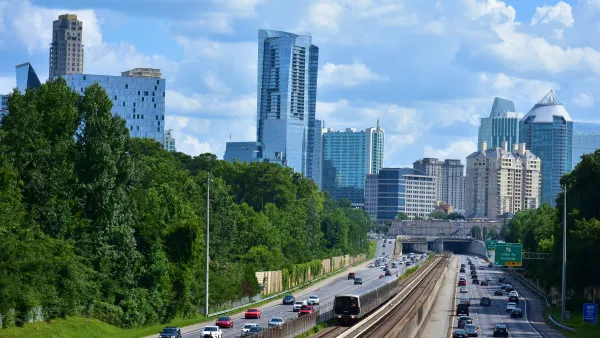Ann Mesnikoff, Director of the Sierra Club Green Transportation Campaign, looks at the CBO's Highway Trust Fund report on the relationship between fuel economy standards and projected gas tax revenues, and finds it too hypothetical.
While a House/Senate conference committee has convened to reauthorize the bill that will fund the federal transportation program, the Congressional Budget Office examines a problem the committee has already encountered: declining fuel tax receipts that are projected to decline even further in the future.
New federal fuel efficiency standards, intended to go into effect in 2017 may save motorists $68 billion in fuel costs by 2030, but may cost the government $57 billion in deprived revenue to the Highway Trust Fund (HTF) between 2012 and 2022. The latter is one of the findings of the Congressional Budget Office (CBO) in a report released May 2 entitled "How Would Proposed Fuel Economy Standards Affect the Highway Trust Fund?"
Mesnikoff agrees that it's important to document how the proposed standards will reduce transportation revenue but takes issue with the time periods used for the projected shortfalls.
Writing in the Sierra Club's energy newsletter, Compass, she indicates that "the CBO notes that improved fuel efficiency would eventually cause annual gas tax revenues to fall by 21% -- in 2040. For some reason, however, CBO chose to apply that out-year reduction in 2040 to the years 2012-2022."
The report has a chart showing that HTF stopped meeting the nation's transportation needs in 2008, requiring transfers from the general fund.
"We can increase gas taxes, make it a sales tax, put a fee on each barrel of oil, or we can start paying per mile we drive," Mesnikoff concludes. "There are other ways to generate revenue. But first, CBO should give us some good math, not a hypothetical."
Thanks to Ann Mesnikoff
FULL STORY: Transportation: $57 Billion? Let's Take a Closer Look

National Parks Layoffs Will Cause Communities to Lose Billions
Thousands of essential park workers were laid off this week, just before the busy spring break season.

Retro-silient?: America’s First “Eco-burb,” The Woodlands Turns 50
A master-planned community north of Houston offers lessons on green infrastructure and resilient design, but falls short of its founder’s lofty affordability and walkability goals.

Delivering for America Plan Will Downgrade Mail Service in at Least 49.5 Percent of Zip Codes
Republican and Democrat lawmakers criticize the plan for its disproportionate negative impact on rural communities.

Test News Post 1
This is a summary

Test News Headline 46
Test for the image on the front page.

Balancing Bombs and Butterflies: How the National Guard Protects a Rare Species
The National Guard at Fort Indiantown Gap uses GIS technology and land management strategies to balance military training with conservation efforts, ensuring the survival of the rare eastern regal fritillary butterfly.
Urban Design for Planners 1: Software Tools
This six-course series explores essential urban design concepts using open source software and equips planners with the tools they need to participate fully in the urban design process.
Planning for Universal Design
Learn the tools for implementing Universal Design in planning regulations.
EMC Planning Group, Inc.
Planetizen
Planetizen
Mpact (formerly Rail~Volution)
Great Falls Development Authority, Inc.
HUDs Office of Policy Development and Research
NYU Wagner Graduate School of Public Service




























